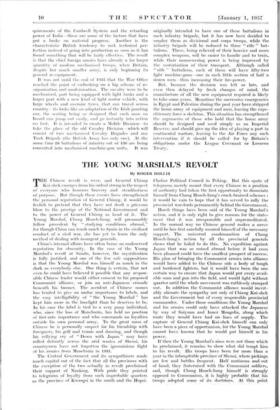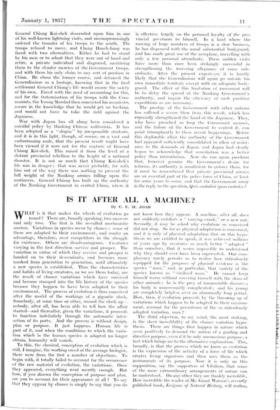THE YOUNG MARSHAL'S REVOLT
By ROGER HOLLIS
China's internal affairs have often borne an undeserved reputation for obscurity. In the ease of the Young Marshal's revolt at Sianfu, however, the mystification is fully justified, and one of the few safe suppositions is that the Young Marshal was himself as much in the dark as everybody else. One thing is certain, that not even he could have believed it possible that any respon- sible Chinese leader would either consent to his proposed Communist alliance, or join an anti-Japanese crusade beneath his banner. The accident of Chinese names has tended to give an undue importance to labels, and the easy intelligibility of " the Young Marshal " has kept him more in the limelight than he deserves to be. In his ease the label is tied to a very puny individual, who, since the loss of Manchuria, has held no position of first-rate importance and who commands no loyalties outside his own personal army. To the great mass of Chinese he is personally suspect for his friendship with foreigners, his golf and tennis and dancing, and though his rallying cry of " Down with Japan " may have rolled defiantly across the arid wastes of Shensi, his countrymen have not forgotten the ignominious flight of his armies from Manchuria in 1931.
The Central Government and its sympathisers made much capital out of the fact that all the provinces with the exception of the two actually in revolt proclaimed their support of Nanking. With pride they pointed to telegrams of loyalty from such improbable quarters as the province of Kwangsi in the south and the Hopei- Chahar Political Council in Peking. But this spate of telegrams merely meant that every Chinese in a position of authority had taken the first opportunity to dissociate himself from Chang Hsueh-liang's crack-brained schemes : it would be vain to hope that it has served to rally the provincial war-lords permanently behind the Government.
Harsh things have been said of the Young Marshal's action, and it is only right to give reasons for the state- ment that it was irresponsible and unpremeditated. In the normal way no Chinese general makes a move until he has first carefully assured himself of the necessary support. The universal condemnation of Chang. Hsueh-liang's action by all the provincial generals shows that he failed to do this. No expedition against Japan that was so noised abroad before it had even been planned could have the smallest prospect of success. His plan of bringing the Communist armies into affiance would have added to the Chinese side a body of tough. and hardened fighters, but it would have been the one certain way to ensure that Japan would put every avail- able man and gun into the field, and would fight without quarter until the whole movement was ruthlessly stamped out. In addition the Communist alliance would inevit- ably alienate the sympathy not only of Chiang Kai-shek and the Government but of every responsible provincial commander. Under those conditions the Young Marshal and his armies could only have attacked the Japanese by way of Suiyuan and Inner Mongolia, along which route they would have had no lines of supply. The capture of General Chiang Kai-shek himself can only have been a piece of opportunism, for the Young Marshal cannot have known that he would put himself in his power.
If then the Young Marshal's aims were not those which he proclaimed, it remains to show what did tempt him. to his revolt. His troops have been for more than a year in the inhospitable province of Shensi, where pickings are few and battles frequent. Half mutinous and out of hand, they fraternised with the Comnuinist soldiers, and, though Chang Hsueh-liang himself is strongly opposed to Communism, it is highly probable that his troops adopted some of its doctrines. At this point General Chiang Kai-shek descended upon him in one of his well-known lightning visits, and uncompromisingly ordered the transfer of his troops to the south. The troops refused to move, and Chang Hsueh-liang was faced with two alternatives. Either he had to stand by his men or to admit that they were out of hand and .retire, a private individual and disgraced, sacrificing them to the slender mercies of the Government troops, and with them his only claim to any sort of position in China. He chose the former course, and detained the Generalissimo as a hostage, knowing that in the final settlement General Chiang's life would ensure the safety of his own. Faced with the need of accounting for this, and for the fraternisation of his troops with the Com- munists, the Young Marshal then concocted his manifesto, secure in the knowledge that he would get no backing, and would not have to take the field against the Japanese.
War with Japan has all along been considered a suicidal policy by thinking Chinese militarists. It has been adopted as a "slogan" by irresponsible students, and it is in this light, though, of course, on a vast and embarrassing scale, that the present revolt might have been viewed if it were not for the capture of General Chiang Kai-shek. This raised it from the level of a distant provincial rebellion to the height of a national disaster. It is not so much that Chiang Kai-shek's life was in danger : that was never probable, for with him out of the way there was nothing to prevent the full weight of the Nanking armies falling upon the mutineers. General Chiang has built up the authority of the Nanking Government in central China, where it is effective, largely on the personal loyalty of the pro- vincial governors to himself. In a land where the moving of large numbers of troops is a slow business, he has dispensed with the usual substantial bodyguard, and has made great. use of the aeroplane, travelling with only a few personal attendants. These sudden visits have more than once been strikingly successful in strengthening the wavering allegiance of some sub- ordinate. After the present experience it is hardly likely that the Generalissimo will' again go outside his own immediate territory except with an adequate body- guard. The effect of this limitation of movement will be to delay the spread of the Nanking Government's authority, and impair the efficiency of such punitive expeditions as are necessary.
The prestige of the Government. with other nations has suffered a severe blow front this revolt, which has especially strengthened the hand of the Japanese. They, who have preached so long the Communist menace, and the failure of the Government. to control it, (.1111 point triumphantly to these recent happenings. Before this deplorable affair the authority of the Government had appeared sufficiently consolidated to allow of resist- ance to the demands of Japan. and Japan had clearly begun to acknowledge that conciliation was a better policy than intimidation. Now she can again proclaim that, however genuine the Government's desire for Teforms, its authority is insufficient to enforce them, Jim it must be remembered that private provincial armies are an essential part of the police force of Chum, at least for some years to come, and that the Government army is the reply to I he question, Quis custodiel ipsos custodes ?







































 Previous page
Previous page